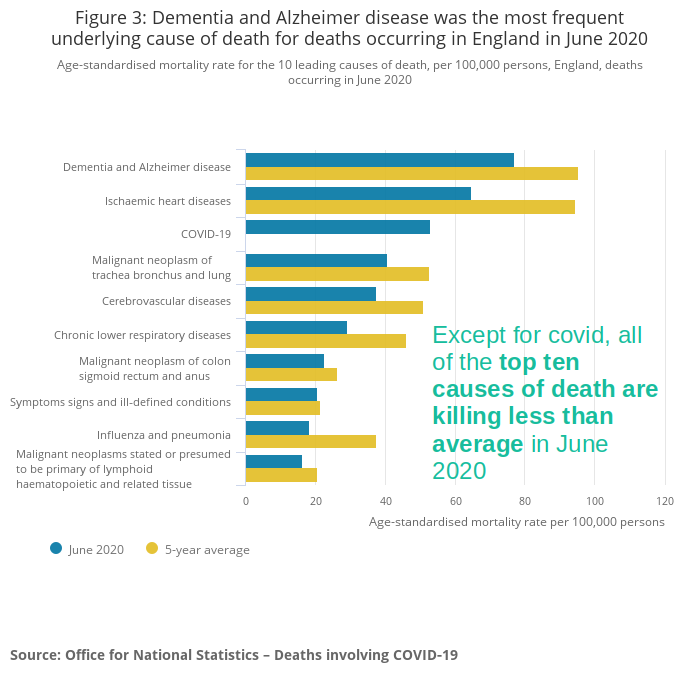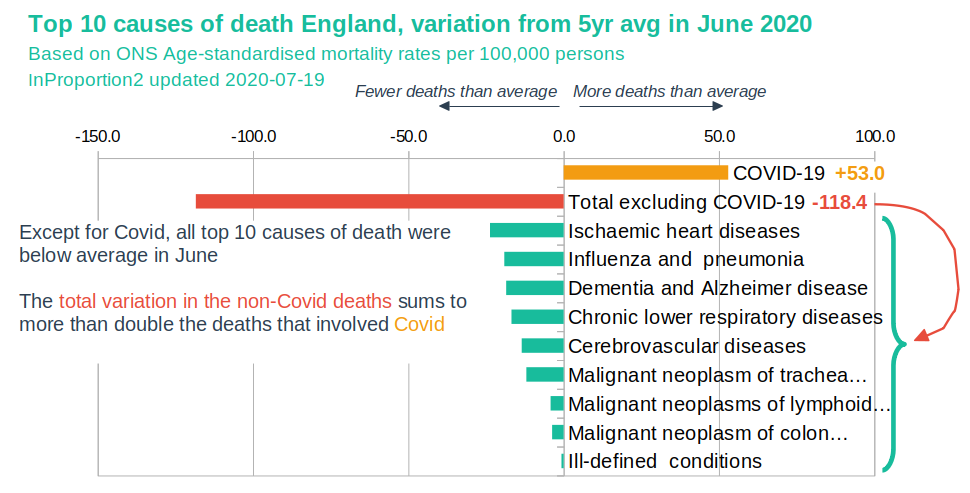On the 17th July the Office for National Statistics published this astonishing chart :[1]

The Daily Mail were quick to point out that in June, covid was the third most significant cause of death [2] but no one seems to have drawn much attention to the most startling aspect of the new data:
In June all the normal leading causes of death were killing significantly fewer people than the five year average.
Are all the causes of death magically declining while covid grows?
Reductions in the non-covid leading causes of death sum to more than double the increases in deaths involving covid
The ONS data is provided in an "age-standardised" format so the actual numbers of people dying are not provided. Instead numbers are adjusted to suit a theoretical standardised age breakdown to facilitate comparisons between years and countries where the age breakdown of populations may be different[3]. For this reason, the actual numbers of people dying from the different causes cannot be determined.
We can, however, do some simple arithmetic to compare the extent to which the decline in the top ten causes of death might compensate for the increase in deaths in June 2020 due to Covid.
In the next chart, the differences from average for the non-covid leading causes of deaths are totalled and compared to the deaths due to covid. Overall, the variation of reduced deaths in all categories sums to more than double the amount for Covid.

It is very unlikely that deaths from heart disease, influenza, dementia and alzheimers, neoplasms (mostly cancers) and all the other top ten leading causes of death should all reduce at the same time. So what can be going on?
A number of experts have warned that to restrict access to the healthcare system could have deadly consequences for significant numbers. This would be true whether healthcare services were deliberately cancelled or postponed in response to covid or whether fear scared people away from healthcare services. This advice provided to the UK Government by its behavioural science team suggest that a disproportionate fear of covid was stirred up deliberately:
A substantial number of people still do not feel sufficiently personally threatened.
The perceived level of personal threat needs to be increased among those who are complacent, using hard-hitting emotional messaging.[4]
In June, researchers were revealing the following to the Guardian [5]:
Almost two-thirds of Britons with common life-threatening conditions have been denied care by the NHS because hospitals have focused on fighting Covid-19, new research has revealed.
Seven out of 10 people with diabetes, 65% of those with high blood pressure and 64% of people suffering from breathing problems have had care cancelled by the NHS across the UK during the pandemic.
Even a majority of cancer patients have been left unable to access treatment in the normal way, the biggest study of the suspension of NHS care during the pandemic has found.
It seems that both fear of and actual denial of care have both been factors in the dramatic reductions in number of people getting the healthcare they need.
There are too many questions on this data to draw firm conclusions, but some questions with awful ramifications need to be asked:
Has denying healthcare to as many as two thirds of those with life threatening conditions been deadly to a large number already?
Are many of these "collateral" deaths concealed in a large number of deaths wrongly attributed to covid?
Sources and Notes:
-
[3] In this report ([2]) Age-standardised mortality rates (ASMRs) are provided per 100,000 population, standardised to the 2013 European Standard Population. Monthly rates in this bulletin are adjusted to allow for comparisons with annual rates.
-
[4] How SAGE and the UK media created fear in the British public, evidencenotfear.com, 27 June 2020
-
[5] Britons with life-threatening conditions denied care during pandemic, Guardian, 8 June 2020